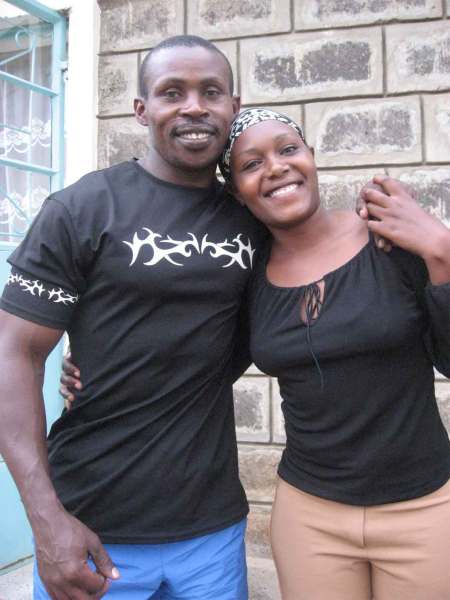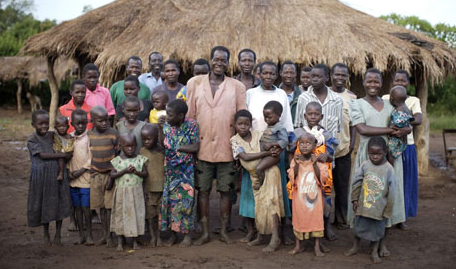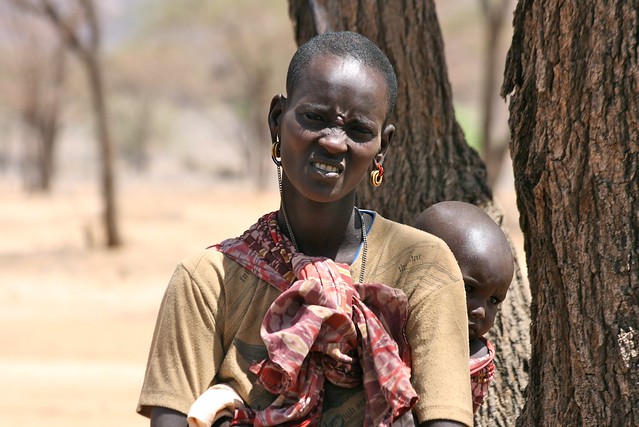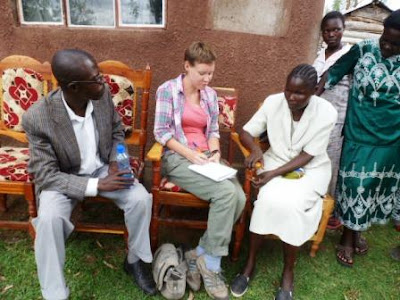One of the best things about living in a new culture is realising all the opinions that you’ve built up over a lifetime, might just be complete rubbish. Life here exposes my beliefs as one of many possible versions. Mine are simply local to the society I was raised in.
Discovering new ways of looking at the world is thrilling; today I’d like to show you how 11 months of conversations have shown me there’s no single view of marriage. Join me for a tale of love and marriage that might just change my life...
_________________________________________________
I am married in Kenya
 I’m at work, telling an office-mate about the weekend trip that Dan and I had taken together, and she looks more and more confused. Finally, she asks: but why do you call Dan your boyfriend? Are you not serious about him? Very serious! I assure her, we’ve been together for almost 10 years. Her response is simple: then he is your husband.
I’m at work, telling an office-mate about the weekend trip that Dan and I had taken together, and she looks more and more confused. Finally, she asks: but why do you call Dan your boyfriend? Are you not serious about him? Very serious! I assure her, we’ve been together for almost 10 years. Her response is simple: then he is your husband.
In Kenya’s conservative society, this bride price transaction gives societal cover for the couple to now live together, have children, and save for the big white (legal) wedding every Kenyan lady dreams of. She has been bought for her husband’s family, to which she now belongs. A married woman leaves her own family forever; her relatives cannot stay overnight in their house, for most tribes her children belong to her husband’s family, and if she socialises with her own parents, it is never in the company of her husband. Telling my married male colleague about plans I had for my parent’s visit back in March, I described the trip Dan and I would take with them. This is so strange in my culture! He exclaimed, You mean you’ll walk around with YOUR parents, in public, the four of you? He actually shivered.
_________________________________________________
I am married in Kenya
 I’m at work, telling an office-mate about the weekend trip that Dan and I had taken together, and she looks more and more confused. Finally, she asks: but why do you call Dan your boyfriend? Are you not serious about him? Very serious! I assure her, we’ve been together for almost 10 years. Her response is simple: then he is your husband.
I’m at work, telling an office-mate about the weekend trip that Dan and I had taken together, and she looks more and more confused. Finally, she asks: but why do you call Dan your boyfriend? Are you not serious about him? Very serious! I assure her, we’ve been together for almost 10 years. Her response is simple: then he is your husband.
Here in Kenya, the words ‘husband’ and ‘wife’ show a commitment made between two people not necessarily joined by law. In fact most Kenyans I know started their married life not at a courthouse, but at a bride price negotiation, a crucial settlement between families. The groom’s family pay bride price, or an amount of livestock in exchange for her hand in marriage (or sometimes the cash equivalent of 10 goats = 1 cow). I first learnt about this, when writing Monicah’s story last year.
(‘Boyfriend’ seems to signal a relationship that’s new, or something extra-marital. If I mention my boyfriend, Kenyans have been moved to ask me, so do you have a husband (as well)?).
(‘Boyfriend’ seems to signal a relationship that’s new, or something extra-marital. If I mention my boyfriend, Kenyans have been moved to ask me, so do you have a husband (as well)?).
In Kenya’s conservative society, this bride price transaction gives societal cover for the couple to now live together, have children, and save for the big white (legal) wedding every Kenyan lady dreams of. She has been bought for her husband’s family, to which she now belongs. A married woman leaves her own family forever; her relatives cannot stay overnight in their house, for most tribes her children belong to her husband’s family, and if she socialises with her own parents, it is never in the company of her husband. Telling my married male colleague about plans I had for my parent’s visit back in March, I described the trip Dan and I would take with them. This is so strange in my culture! He exclaimed, You mean you’ll walk around with YOUR parents, in public, the four of you? He actually shivered.
My two oldest male colleagues have wives who have given birth to 6 children between them, but neither couple is lawful. My legally married (female) colleague is shocked by this, and believes that no woman should settle for bride price alone. Those guys are providing no security for their wives! She tells me that either man could choose another woman to be legal Wife Number One at any time, leaving the mother of their children to be only a second wife, a much more lowly position.
Four wives are better than one
Polygamy is legal here, and has been a traditional part of Kenyan culture for generations. Whilst my (urban) Kenyan friends often talk about it in the past tense (I’m always being told, my Grandfather had 3/9/12 wives), or as something which now only exists in ‘rural areas’ (read: in a less educated Kenya), the practice is still admired by many. The Chairman of a local branch of my organisation smiles at me and says: When I have more money, I will take a second wife. I ask him why he needs more than one, and his answer is based firstly on economics, he tells me:
Two wives can work more, have more children and a bigger family contributes more income. Once I can afford another wife, I will take one. Plus, we Kenyan men need sex. How do the British men last 9 months when their wife is pregnant?
(Sex during pregnancy is clearly taboo for this marriage).
It seems that a discussion on marriage is not complete without also looking at children. Let me explain how the questions of how many children, and how they are raised cut right to the heart of love and marriage in Kenya.
Families: bigger the better
Kenyan families have always been large, and polygamy is certainly a factor. The common theme in tribal beliefs seems to be that children equal status and money. In the 1970s, the average Kenyan mother had 8 children (!!), and today’s average is still 4.8. Sometimes it seems that having just one child is as good as none. For a marriage to work, they must arrive in large numbers.
My colleague tells me how tough life is at the moment, how tight their money is stretched by raising children from her husband’s marriage with a late wife, and some local children she has taken in from her church. But there will be another, in December, she sighs, patting her tummy. My unasked question is: but why another when you struggle to feed those you have? She must have seen it on my face, and so replies, We only have one child together, and it is not enough.
Childlessness is a sensitive subject anywhere in the world, but a curse in Kenya. It seems that all married women have children, perhaps because the familial agreement is rescinded if children don’t follow on swiftly. For the wealthy, there are other options it seems. Sitting in the maternity ward, carefully nursing her newborn baby, my colleague’s wife was approached by a well-off couple. They offered us money for our child! he told me, still in shock.
How to have it all
Having many children is important at every level of Kenyan society: the glossy, successful female CEOs and Senior Executives profiled in the newspaper are always mothers. In fact, it’s much easier to be a working mum in Kenya, than for mothers in the UK. Kenyan women can hire round-the-clock, live-in ‘help’ for housework and childcare for as little as 7000 bob in Nairobi, much less in other parts of Kenya. For less than £50 a month, women can go back to work. No trying to ‘do it all’ in this culture, juggling childcare, housework and impressing the boss - women of all income levels are supported back into the workplace with the minimum of fuss: even our office cleaner explained why she was run so ragged this month, because you know I am operating without a housegirl.
 My 20-something male colleagues model themselves on ‘western’ families: one husband, one wife, both having a career. In previous generations, education could only be afforded for a ‘first born’ or perhaps only for sons, but my colleagues know investing in senior and higher education for the ir children is vital, so maybe they can only afford 2 or 3. Three graduates is better for the family than a massive brood of 12-year-old school leavers. My colleague says, if I am blessed with only girls I am still a happy man. They talk about their wife’s needs; they change nappies, and answer the night-time cries.
My 20-something male colleagues model themselves on ‘western’ families: one husband, one wife, both having a career. In previous generations, education could only be afforded for a ‘first born’ or perhaps only for sons, but my colleagues know investing in senior and higher education for the ir children is vital, so maybe they can only afford 2 or 3. Three graduates is better for the family than a massive brood of 12-year-old school leavers. My colleague says, if I am blessed with only girls I am still a happy man. They talk about their wife’s needs; they change nappies, and answer the night-time cries.
While this situation seems to scream of female empowerment, there are several thoughts lurking beneath the surface which trouble me, because they move so far away from my home culture:
Firstly) do men marry for the extra income? Margins are so tight for the average Kenyan family that the ‘double income’ we see as a sign of wealth in the UK, can be essential here for basic survival.
Secondly) What about these young women who live in strange homes performing menial domestic tasks all day for just over $1 a day in a big city? What are their dreams? They daren’t dream of education, not in a culture without washing machines or ready meals. My housegirl left to get married, grumbles a colleague, my sister is sending us a new girl from our rural area. I ask him why put a scared teenager on a bus to Nairobi for the first time, when there’s such unemployment in this city? He looks at me like I’m stupid. Because the girl who raises my children must speak my local language, of course!
And here we come to thought number 3) which troubles me. I’m told that many women hire help for the house, simply so their focus doesn’t stray from their husband. A Kenyan friend articulates what I’ve seen everywhere in Kenya: men expect many children from their marriage, but are not expected to help raise them. And every minute a woman spends attending to the child in the home, is time not spent attending to her husband’s needs. I’m sure this is a grumble in marriages worldwide, but this economy provides a ‘solution’. If the housegirl takes care of all chores, our working Kenyan mother has no excuse not to meet all the marital duties her husband expects of her, especially the business of making more babies, whether she chooses to or not.
Does marriage burden women?
My opinions are simply a product of where I come from, I know that. And I try not to leap to conclusions, to see injustice everywhere - I know I'm not a cultural expert. But it's difficult; from all these conversations, I start to form an opinion that marital duties in Kenya are a real burden placed on women. Allow me to tell a story to back up my claim.
Babies in Kenya are carried on mothers' backs, within a kanga or lesso (piece of fabric) tied around her body. My colleague describes what happens when women from her village board the matatu (public service minibus), but forget the child. Stooping down to quickly squeeze onto the tiny vehicle, the child’s head resting on her back is clanged violently into the metal door frame. Everyone in the matatu is allowed to slap the mother for being so stupid. I ask her how often this happens. All the time, rural women carry their baby for miles so forget it is there. Unlike the matatu passengers, I didn’t judge the women. It was no stretch of my imagination to see a tired young wife, carrying her sixth child. She has no voice in when or how she reproduces. Slung onto her back, the baby is not a precious life, but simply a burden to be carried.
Let me share a more shocking example from a recent new item. A newborn baby was found in the fields of Kalifi county, seriously disfigured and with an unattached hand; this three-day-old child had been abandoned and then mauled by dogs. The baby's 23-year-old mother was found and charged. She blamed her crime on her husband - things were bad between them, and she couldn't cope with another child. Officials actually pleaded in the paper for mothers who felt overburdened to please take unwanted children to adoption services, and not simply throw them away. It seems this is not an isolated case.
A VSO friend suggests a solution to these burdens: polygamy. She tells me her colleague is delighted that her husband is taking a second wife. This younger woman will be subservient to her, do most of the housework, and bear the full load of duties in the marital bed. She is so pleased! my friend tells me. Is this the true definition of having it all?
Whatever your views on polygamy, there is a view that taking another wife only legitimises what happens anyway, as someone commented to me recently: there is no expectation of fidelity within a Kenyan marriage. I’ve seen with my own eyes how some Kenyan men don’t even pretend to be faithful to the mother of their children. It troubles me that again this burdens their wives back home. In a country where 6% of the population is HIV positive, extra-marital sex is the top reason in some reports for why Kenya has a higher HIV prevalence rate than some of its African neighbours. Most HIV-positive Kenyans are women, but the vast majority have only ever had one sexual partner: their husband.
Times are changing
Opinions differ on whether the situations I describe belong to an older Kenya, or if they now exist only in rural areas, and I doubt my whistle-stop tour of gender politics will find a definitive answer. I can only report what I’ve been told.
But I'm seeing another very clear theme come through: younger, urban, educated couples are throwing off traditional beliefs and with it the burden on women I’ve described.
But I'm seeing another very clear theme come through: younger, urban, educated couples are throwing off traditional beliefs and with it the burden on women I’ve described.
 My 20-something male colleagues model themselves on ‘western’ families: one husband, one wife, both having a career. In previous generations, education could only be afforded for a ‘first born’ or perhaps only for sons, but my colleagues know investing in senior and higher education for the ir children is vital, so maybe they can only afford 2 or 3. Three graduates is better for the family than a massive brood of 12-year-old school leavers. My colleague says, if I am blessed with only girls I am still a happy man. They talk about their wife’s needs; they change nappies, and answer the night-time cries.
My 20-something male colleagues model themselves on ‘western’ families: one husband, one wife, both having a career. In previous generations, education could only be afforded for a ‘first born’ or perhaps only for sons, but my colleagues know investing in senior and higher education for the ir children is vital, so maybe they can only afford 2 or 3. Three graduates is better for the family than a massive brood of 12-year-old school leavers. My colleague says, if I am blessed with only girls I am still a happy man. They talk about their wife’s needs; they change nappies, and answer the night-time cries.
Another clear step away from older beliefs is taken by two people of different tribes. These couples have less shared traditions, no truck with mother-tongue. They raise their children in Swahili, to see themselves as Kenyan first and foremost, with no ethnic bias. They are already open-minded by dint of their union, and they talk about... love.
There are statistics to back-up my belief. Once the nation with the fastest population growth on earth (from 2.9 million in the 1920s to 30 million in the 1990s), the 2000s saw Kenyans having many fewer children. There are 40 million people in Kenya today.
Are we seeing Kenya move closer to what I (and the UK) define as marriage? Am I allowed to see that as a positive move, towards greater equality and with less burden on women? If it gives me ‘hope,’ do I sound arrogant?
I won’t pretend that the Global North has love and marriage all figured out, when two thirds of British marriages fail. And I do understand how marriage is vital to provide for women in a society in which they cannot legally own land. But I still prefer the equality integral in my definition of the word ‘marriage’, can’t let go of my sense of right and wrong.
Some cultural difference are harmless though, and I happily adapt to make things easier for everyone. At first it was strange to call Dan ‘my husband’, having never tied the knot back home. But, weirdly, I’ve found I like demonstrating the commitment that the word means here. It makes me wonder whether I’ll miss using the word when we return to the UK, and how to demonstrate my commitment to him in a way that makes sense in my home culture...
...no promises ;o)












































